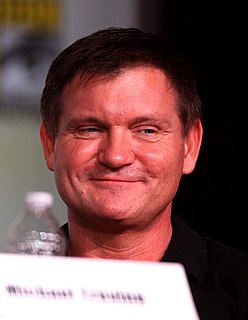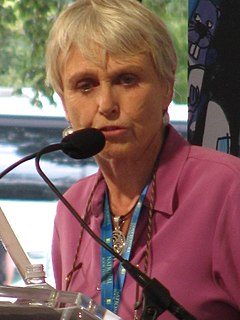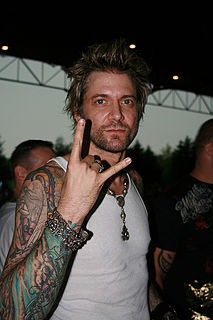A Quote by Kevin Williamson
The poets and philosophers I once loved had it wrong. Death does not come to us all, nor does the passage of time dim our memories and reduce our bodies to dust. Because while I was considered dead, and a headstone had been engraved with my name, in truth my life was just beginning.
Related Quotes
We come before God to pray for the missing and the dead, and for those who loved them... Our purpose as a nation is firm, yet our wounds as a people are recent and unhealed and lead us to pray... This world he created is of moral design. Grief and tragedy and hatred are only for a time. Goodness, remembrance, and love have no end, and the Lord of life holds all who die and all who mourn... Neither death nor life nor angels nor principalities, nor powers nor things present nor things to come nor height nor depth can separate us from God's love.
Have you noticed that only in time of illness or disaster or death are people real? I remember at the time of the wreck-- people were so kind and helpful and solid. Everyone pretended that our lives until that moment had been every bit as real as the moment itself and that the future must be real too, when the truth was that our reality had been purchased only by Lyell's death. In another hour or so we had all faded out again and gone our dim ways.
For ever and ever, we say when we are young, or in our prayers. Twice, we say it. Old One, do we not? For ever and ever ... so that a thing may be for ever, a life or a love or a quest, and yet begin again, and be for ever just as before. And any ending that may seem to come is not truly an ending, but an illusion. For Time does not die, Time has neither beginning nor end, and so nothing can end or die that has once had a place in Time.
And what, you ask, does writing teach us? First and foremost, it reminds us that we are alive and that it is gift and a privilege, not a right. We must earn life once it has been awarded us. Life asks for rewards back because it has favored us with animation. So while our art cannot, as we wish it could, save us from wars, privation, envy, greed, old age, or death, it can revitalize us amidst it all.
In our memories, there is a graveyard where we bury our dead. They all lie there together, the loved ones and the ones we hated, friends and foes and kin, with no distinction among them. We have to mourn every one of them, because our memories have made them as much a part of us as our bones or our skin. If we don't, we've no right to remember anything at all.
I saw full surely that ere God made us He loved us; which love was never slacked, nor ever shall be. And in this love He hath done all His works; and in this love He hath made all things profitable to us; and in this love our life is everlasting. In our making we had beginning; but the love wherein He made us was in Him from without beginning: in which love we have our beginning. And all this shall we see in God, without end.
We are the spirit children of a Heavenly Father. He loved us and He taught us before we were born into this world. He told us that He wished to give us all that He had. To qualify for that gift we had to receive mortal bodies and be tested. Because of those mortal bodies, we would face pain, sickness, and death.
...the gross national product does not allow for the health of our children, the quality of their education or the joy of their play. It does not include the beauty of our poetry or the strength of our marriages, the intelligence of our public debate or the integrity of our public officials. It measures neither our wit nor our courage, neither our wisdom nor our learning, neither our compassion nor our devotion to our country, it measures everything in short, except that which makes life worthwhile.
But compassion is a deeper thing that waits beyond the tension of choosing sides. Compassion, in practice, does not require us to give up the truth of what we feel or the truth of our reality. Nor does it allow us to minimize the humanity of those who hurt us. Rather, we are asked to know ourselves enough that we can stay open to the truth of others, even when their truth or their inability to live up to their truth has hurt us.
Another misconception is that if we truly loved someone, we will never finish with our grief, as if continued sorrow is a testimonial to our love. But true love does not need grief to support its truth. Love can last in a healthy and meaningful way, once our grief is dispelled. We can honor our dead more by the quality of our continued living than by our constantly remembering the past.
...night possessed us and the shadow of death encompassed us, for we had fallen into sin and lost the power of sight which was ours by God's grace and by which we were able to perceive the light that bestows true life. Night and death had been poured out on our human nature, not because of any change in the true light, but because we had turned aside and no longer had any inclination towards the life-bearing light. In the last times, however, the Giver of eternal light and Source of true life has had mercy upon us.
At a certain age, we have already been struck by love; it no longer develops alone, according to its own mysteries and fateful laws while our hearts stand by startled and passive. We come to its assistanceRecognizing one of its symptoms, we recall, we bring back to life the others. Since we possess its song engraved in its totality within us, we do not need for a woman to tell us the beginning--filled with admiration inspired by beauty--to find the continuation.
Our character is composed of our ideas and our feelings: and, since it has been proved that we give ourselves neither feelings nor ideas, our character does not depend on us. If it did depend on us, there is nobody who would not be perfect. If one does not reflect, one thinks oneself master of everything; but when one does reflect, one realizes that one is master of nothing
Honor to the idealists, whether philosophers or poets. They have improved us by mingling with our daily pursuits great and transcendent conceptions. They have thrown around our sensual life the grandeur of a better, and drawn us up from contacts with the temporal and the selfish to communion with beauty and truth and goodness.
The time will come when diligent research over periods will bring to light things which now lie hidden...Many discoveries are reserved for ages still to come, when memories of us will have been effaced. Our universe is a sorry little affair unless it has something for every age to investigate. nature does not reveal her mysteries once and for all.



































